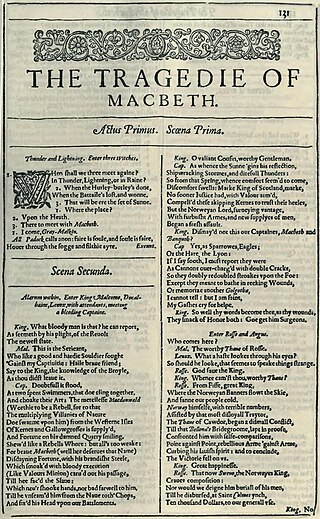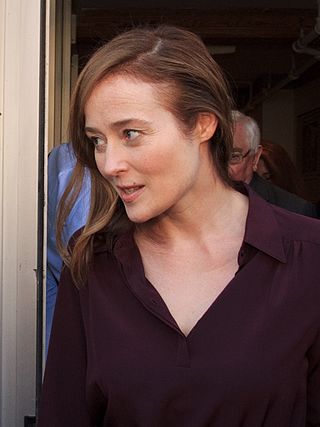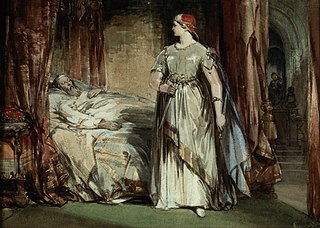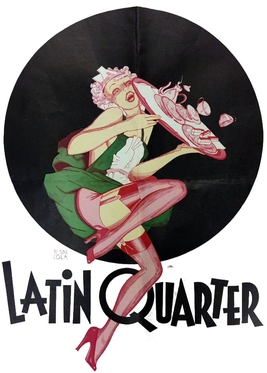Related Research Articles

The Tragedy of Hamlet, Prince of Denmark, often shortened to Hamlet, is a tragedy written by William Shakespeare sometime between 1599 and 1601. It is Shakespeare's longest play. Set in Denmark, the play depicts Prince Hamlet and his attempts to exact revenge against his uncle, Claudius, who has murdered Hamlet's father in order to seize his throne and marry Hamlet's mother. Hamlet is considered among the "most powerful and influential tragedies in the English language", with a story capable of "seemingly endless retelling and adaptation by others". It is widely considered one of the greatest plays of all time. Three different early versions of the play are extant: the First Quarto ; the Second Quarto ; and the First Folio. Each version includes lines and passages missing from the others.

Macbeth is a tragedy by William Shakespeare. It is thought to have been first performed in 1606. It dramatises the damaging physical and psychological effects of political ambition on those who seek power. Of all the plays that Shakespeare wrote during the reign of James I, Macbeth most clearly reflects his relationship with King James, patron of Shakespeare's acting company. It was first published in the Folio of 1623, possibly from a prompt book, and is Shakespeare's shortest tragedy.

Rosencrantz and Guildenstern Are Dead is an absurdist, existential tragicomedy by Tom Stoppard, first staged at the Edinburgh Festival Fringe in 1966. The play expands upon the exploits of two minor characters from Shakespeare's Hamlet, the courtiers Rosencrantz and Guildenstern, and the main setting is Denmark.

Sir Tom Stoppard is a Czech-born British playwright and screenwriter. He has written for film, radio, stage, and television, finding prominence with plays. His work covers the themes of human rights, censorship, and political freedom, often delving into the deeper philosophical thematics of society. Stoppard has been a playwright of the National Theatre and is one of the most internationally performed dramatists of his generation. He was knighted for his contribution to theatre by Queen Elizabeth II in 1997.
Theatre techniques are procedures that facilitate a successful presentation of a play. They also include any practices that advance and enhance the understanding the audience brings to the action and the acting by the cast on stage.

The Seagull is a play by Russian dramatist Anton Chekhov, written in 1895 and first produced in 1896. The Seagull is generally considered to be the first of his four major plays. It dramatizes the romantic and artistic conflicts between four characters: the famous middlebrow story writer Boris Trigorin, the ingenue Nina, the fading actress Irina Arkadina, and her son the symbolist playwright Konstantin Treplev.

Maurice Herbert Evans was an English actor, noted for his interpretations of Shakespearean characters. His best-known screen roles include Dr. Zaius in the 1968 film Planet of the Apes and Maurice on Bewitched.

Jennifer Anne Ehle is an American actress. She gained recognition and acclaim for her role as Elizabeth Bennet in the BBC miniseries Pride and Prejudice (1995), for which she received the British Academy Television Award for Best Actress. Known for her roles on Broadway and the West End she has won two Tony Awards as well as a nomination for a Laurence Olivier Award.

A language-game is a philosophical concept developed by Ludwig Wittgenstein, referring to simple examples of language use and the actions into which the language is woven. Wittgenstein argued that a word or even a sentence has meaning only as a result of the "rule" of the "game" being played. Depending on the context, for example, the utterance "Water!" could be an order, the answer to a question, or some other form of communication.

Sherman Howard is an American actor. He is best known for his performance as the zombie Bub in George A. Romero's Day of the Dead (1985) and Lex Luthor on Superboy (1990–92). He also voiced Derek Powers in Batman Beyond (1999–2001).

The Nederlander Theatre is a Broadway theater at 208 West 41st Street in the Theater District of Midtown Manhattan in New York City. Opened in 1921, it was designed by William Neil Smith for theatrical operator Walter C. Jordan. It has around 1,235 seats across two levels and is operated by the Nederlander Organization. Since 1980, it has been named for American theater impresario David Tobias Nederlander, father of theatrical producer James M. Nederlander. It is the southernmost Broadway theater in the Theater District.

Pavel Kohout is a Czech and Austrian novelist, playwright, and poet. He was a member of the Communist Party of Czechoslovakia, a Prague Spring participant and dissident in the 1970s until he was not allowed to return from Austria. He was a founding member of the Charter 77 movement.
Rock 'n' Roll is a play by British playwright Tom Stoppard that premiered at the Royal Court Theatre, London, in 2006.
Professional Foul is a television play written by Czech-born, British playwright Tom Stoppard. It was broadcast on 21 September 1977 in BBC 2's Play of the Week series.

Rosencrantz & Guildenstern Are Dead is a 1990 period black comedy film written and directed by Tom Stoppard based on his 1966 play of the same name. Like the play, the film depicts two minor characters from William Shakespeare's play Hamlet, Rosencrantz and Guildenstern, who find themselves on the road to Elsinore Castle at the behest of the King of Denmark.
After Magritte is a surreal comedy written by Tom Stoppard in 1970. It was first performed in the Green Banana Restaurant at the Ambiance Lunch-hour Theatre Club in London.

King Duncan is a fictional character in Shakespeare's Macbeth. He is the father of two youthful sons, and the victim of a well-plotted regicide in a power grab by his trusted captain Macbeth. The origin of the character lies in a narrative of the historical Donnchad mac Crinain, King of Scots, in Raphael Holinshed's 1587 The Chronicles of England, Scotland, and Ireland, a history of Britain familiar to Shakespeare and his contemporaries. Unlike Holinshed's incompetent King Duncan, Shakespeare's King Duncan is crafted as a sensitive, insightful, and generous father-figure whose murder grieves Scotland and is accounted the cause of turmoil in the natural world.

Latin Quarter was a nightclub in New York City. The club originally opened in 1942 and featured big-name acts. In recent years, it had been a focus of hip hop, reggaeton and salsa music. Its history is similar to that of its competitor, the Copacabana.
The Almost Free Theatre was an alternative and fringe theatre set up by American actor and social activist E. D. Berman in 1971 in Rupert Street, Soho, London.
Edward David Berman is an American-born British community educator, social activist, children's poet, playwright, director and producer. In 1979, Queen Elizabeth II appointed Berman an Member of the Order of the British Empire (MBE) for Services to Community Education and Community Arts, examples of which include city farms, Instant Business Enterprise System, the Inter-Action Creative Game Method, Fun Art Bus I & II, the Community Media Van, FabLab on Wheels, the Father and Mother Xmas Union, and Inter-Action – the umbrella organization for a range of innovative, creativity-based projects and community training systems. Later, Berman saved the World War I ship HMS President (1918), which became the charity's centre for 15 years.
References
- ↑ The Broadway League. "Dogg's Hamlet, Cahoot's Macbeth | IBDB: The official source for Broadway Information". IBDB. Retrieved 2012-02-14.